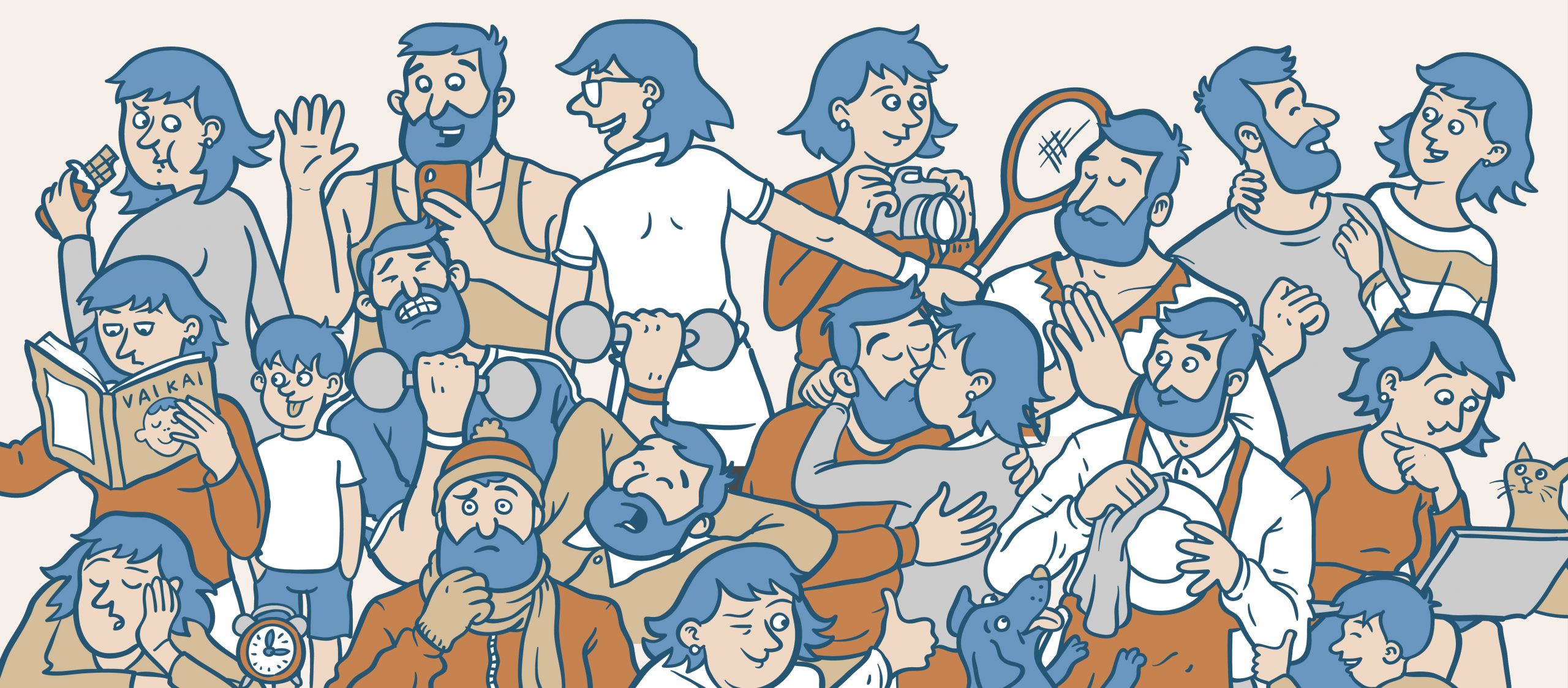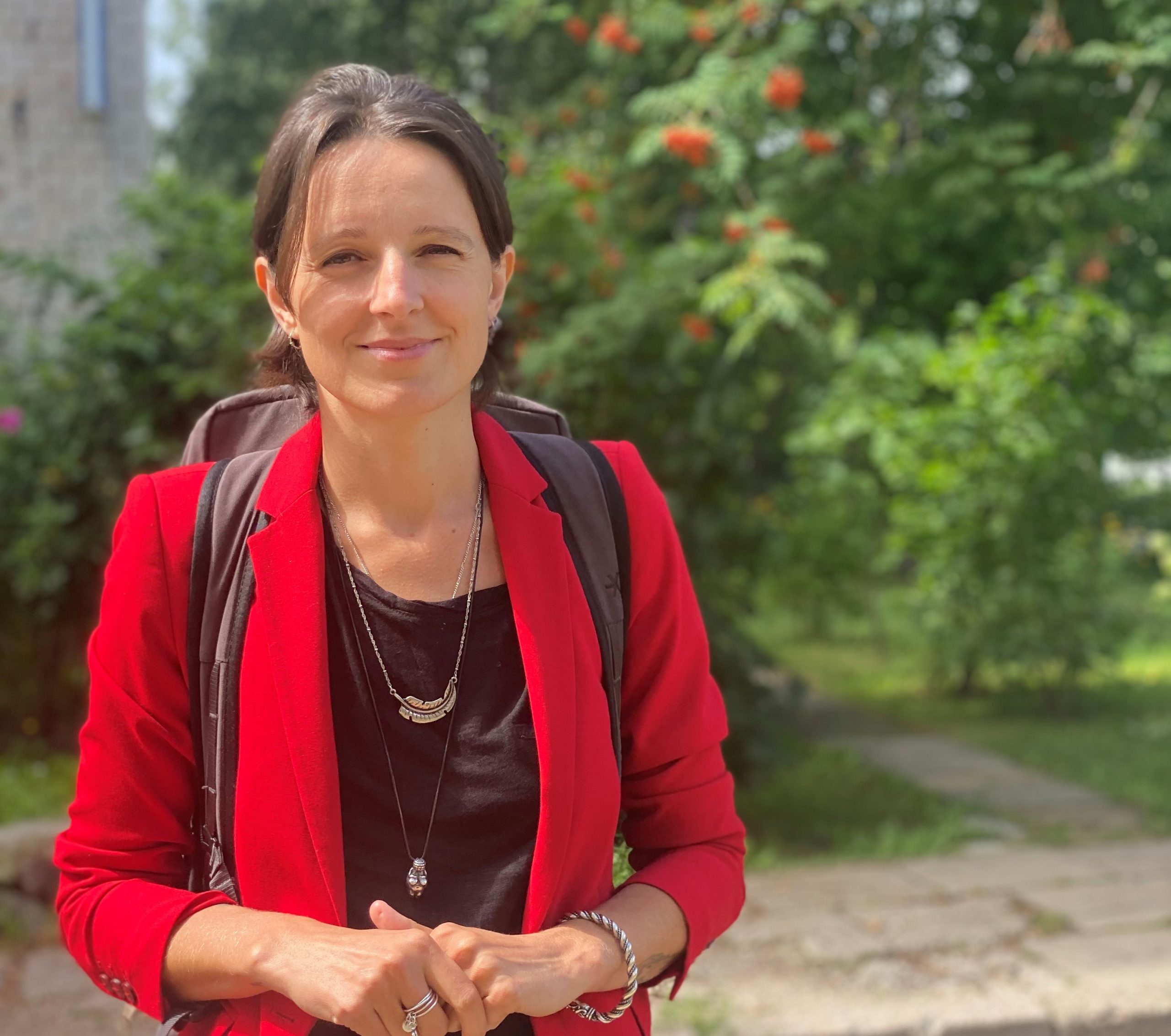- The beginning
- News
- Media analysis showed portraits of mother and father: only mothers are to blame in Lithuania
Media analysis showed portraits of mother and father: only mothers are to blame in Lithuania
Recent public opinion polls have revealed that women feel a constant guilt when combining work and family responsibilities. On the basis of them, the media research company Mediaskopas conducted a media analysis for 2017-2021, which showed the portraits of men and women, fathers and mothers, portrayed in the country’s media, and how the real reasons for mothers’ guilt lie behind public opinion.
Dads are portrayed as helpers
It turns out that “mother’s fault” and “father’s fault” are quite common terms in the Lithuanian media – more than 2 thousand mentions. In general, the flow of information in the media, which mentions “mothers”, is quite stable – about 60-65 thousand messages are recorded per year. “Dad” was mentioned in 55-60 thousand messages a year on average.
“When it comes to ‘good dad’, a lot of emphasis is placed on mom, and when it comes to ‘good mom’, there is no ‘dad’, there are only ‘parents’. There are no expectations or demands on Dad. He is mentioned in the context of the child’s mother and is portrayed more as a helper in raising children – he is said to help or share the child’s care as if the children belong to a mother rather than both parents equally. The media by no means reflects the image that both parents are equal partners in raising a child”, says Jūratė Stankuvienė, director of the media analysis company Mediaskopas.
Shows the causes of emotional burnout in mothers
According to her, the media vividly reinforces the myth that women are born to do a lot of work at once, while men focus on one job at a time.
“When it comes to a man, the so-called ‘multitasking’ disappears: when he works, he works, when he is a dad, he is a dad. Meanwhile, when it comes to moms, “multitasking” dominates everywhere. This analysis has clearly shown that the media support the prevalent tradition of portraying men as hunters and women as berry pickers who need to see the broad picture all the time. These still-popular gender stereotypes seem to imprison both genders: despite the fact that circumstances, opportunities, and lifestyles have changed dramatically since prehistoric times, we are still trapped in the division of jobs and roles of the Stone Age. No matter if you are a mother, no one relieves you from other jobs, hoping that you will do them all perfectly and you will still be a perfect woman – young, beautiful, charming, successful, active, interesting and able to combine everything with ease“, comments the head of Mediaskopas on the content of articles.
In the content of the media, it is clear that the mother has to combine a lot of work, responsibilities, take into account different needs and hence the tension and guilt forms both with respect to the child and the employer.
“We know that doing a lot of work at the same time is one of the main causes of emotional burnout, the source of mental health problems. It has been proven that de facto women are not able to “multitask”, they often have to jump from one task to another, thus burning and wasting a lot of mental energy“, comments Margarita Jankauskaitė, PhD, expert of the Center for the Development of Equal Opportunities.
The combinations of the words “working dad”, “man’s time for himself”, “dad’s time for himself” practically do not exist, because it is the norm, there is no conflict in it. In the case of mothers, meanwhile, work is mentioned particularly often and shows a conflict between motherhood and work.
According to the expert, this explains the answers of women recorded during the investigations of the Office of the Equal Opportunities Ombudsman that even almost 7 out of 10 women feel guilty about combining work and motherhood.
There is plenty of fault of women and men, but in different contexts
Mom and dad are accused in the media with similar intensity, but the key difference is that “women’s guilt” is mentioned in their own emotional context, while “men’s guilt” is mentioned in the context of divorce cases. Even when the word “guilt” comes next to a man, mothers are still being blamed. By the way, mothers-in-law who are blaming the wives are often mentioned here as well.
“When it comes to divorce, in many cases the dad blames the mom, so the words ‘dad’ and ‘guilt’ are linked together. It is interesting that when describing divorce cases, men are often presented as innocent victims of wives, ideal fathers, while women – as “those who were unable to preserve marriage” – J. Stankuvienė analyzes the content of the articles.
Mintautė Jurkutė, the head of the social campaign “What is not told by working mothers?” from the Office of the Equal Opportunities Ombudsman notes that the information field created by the media leads to the conclusion that in our society, mothers are 100{84543568923d32bac0756253b2f9700473756d25e2579816786653b19fab0ca8} responsible for children. Mothers are to blame even for not being able to combine everything.
SOS signal – you feel guilty even for giving birth
An analysis of articles that mention “mother’s guilt” shows that the mentioned mother’s guilt is emotional. Women talk about feeling guilty and experiencing internal conflicts. Starting right from giving birth: many articles about childbirth say that moms feel guilty for not giving birth to a child as ideally as they planned or imagined.
“It shows how strong the public pressure is on mothers, because childbirth is a purely biological process, a physiological function that they cannot control. And even if women start to feel guilty at this point, it means how strong it is the thinking that a woman must control every aspect of her life, even childbirth”, comments M. Jankauskaitė.
According to M. Jurkutė, the data of the media analysis allow to see from more various perspectives the things that women also said during the qualitative study conducted by the Office of the Equal Opportunities Ombudsman, where guilt strongly correlates with the image of a “good mother”, which, in reality, does not necessarily meet the (self)created expectations after giving birth.
Society wants to see only the beautiful side of motherhood
According to M. Jankauskaitė, this analysis of the media content for 2017-2021 shows that although we talk about motherhood on certain occasions, in reality, the society is not ready to hear the real stories and experiences of motherhood.
“Because the patriarchal society understands that when you look openly at the burden carried by mothers, the picture is not bright – there is a lack of help, as well as emotions and fatigue that mothers experience. The society seems to say: we don’t want to know what challenges mothers, especially working mothers, actually face – you go and hide there and take care of everything yourself”, comments M. Jankauskaitė.
An analysis of media content shows how strongly mothers take over the views about what kind of a mother and employee she should be forced upon them by the society.
“The big problem is that women accept what society imposes as the norm – what kind of woman, mother and employee she should have to be to be perfect. Public expectations as the voice of the inner critic lurks inside and berates. For the inner critic to go silent, the public background, including the one created by the media, must radically change and empower other voices within women. It is important for tired working mothers to recognize their well-being in the public information field, to hear that it is not difficult for them alone and it is impossible to satisfy the needs of everyone”, says M. Jankauskaitė.
The bathrobe as a symbol of women’s desire to be free
The analysis of the Lithuanian media for 2017-2021 also revealed many other related nuances. For example, in the news related to the windows of life, there is no mention of a father, only search for the mother is mentioned.
Another observation is that years play a particularly important role in articles about women – the woman’s age is mentioned in the media in many cases, the moment of a woman’s youth is important, but in terms of her career, a woman’s age raises suspicions about her experience and professionalism.
When researching the word combinations “mother’s time for herself”, various household words appear next to them, such as “dryer”, “washing machine” – in such a context that they make daily life easier and help the mother find time for herself.
An unexpected discovery was how often a “bathrobe” was mentioned next to a “woman” as a symbol of a woman’s desire to free herself from the many roles imposed on her, as an opportunity to be herself.

This article is part of the project “Everybody’s Talking: Work-Life Balance Goes Mainstream”, partially funded by the European Union’s Rights, Equality and Citizenship Programme (2014-2020). The content of it is the sole responsibility of the Office of the Equal Opportunities Ombudsperson and can in no way be taken to reflect the views of the European Commission.




